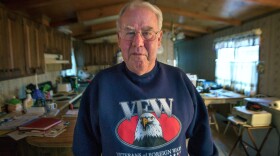
Quil Lawrence
Quil Lawrence is a New York-based correspondent for NPR News, covering veterans' issues nationwide. He won a Robert F. Kennedy Award for his coverage of American veterans and a Gracie Award for coverage of female combat veterans. In 2019 Iraq and Afghanistan Veterans of America honored Quil with its IAVA Salutes Award for Leadership in Journalism.
Lawrence started his career in radio by interviewing con men in Tangier, Morocco. He then moved to Bogota, Colombia, and covered Latin America for NPR, the BBC, and The LA Times.
In the Spring of 2000, a Pew Fellowship sponsored his first trips to Iraq — that reporting experience eventually built the foundation for his first book, Invisible Nation: How the Kurds' Quest for Statehood is Shaping Iraq and the Middle East (Bloomsbury, 2009).
Lawrence has reported from throughout the Arab world and from Sudan, Cuba, Pakistan, Israel, Gaza, and the West Bank. He covered Iraq and Afghanistan for twelve years, serving as NPR's Bureau Chief in Baghdad and Kabul. He covered the fall of the Taliban in 2001, the invasion of Iraq in 2003, the second battle of Fallujah in 2004, as well as politics, culture, and war in both countries.
In 2012, Lawrence returned to the U.S. to cover the millions of men and women who have served at war, both recently and in past generations. NPR is possibly unique among major news organizations in dedicating a full-time correspondent to veterans and the Department of Veterans Affairs.
A native of Maine, Lawrence studied history at Brandeis University, with concentrations in the Middle East and Latin America. He is fluent in Spanish and conversant in Arabic.
-
After scandals around veterans waiting too long for care in 2014, Congress pushed through a $10 billion fix to get those vets care, fast. Now it's almost unanimous: The fix is broken.
-
Military service does not guarantee U.S. citizenship, which has meant a group of veterans has wound up together just over the border in Tijuana, Mexico, at a refuge they've dubbed "The Bunker."
-
U.S. military health care covers the high cost of in vitro fertilization, but the Veterans Affairs health system doesn't. The discrepancy is putting vets with combat injuries in a bind.
-
The study from the Bureau of Justice Statistics is the first government report that includes significant numbers of veterans of the wars in Iraq and Afghanistan.
-
"For my PTSD issues, jail is the least therapeutic atmosphere you could ever imagine," says Iraq veteran David Carlson. "You come in one way and you leave three times worse."
-
Some 13,000 Afghans and Iraqis who worked with the U.S. are awaiting visas they were promised. NPR's Quil Lawrence looks at a case involving an Afghan interpreter who was in the thick of the fighting.
-
For the first time, the triathlon will be an event at the Paralympics. Stockwell, an Iraq veteran, has won international paratraithlons before, but she's still got to qualify for the U.S. team.
-
The Veterans Administration pledged to end homelessness among veterans by this year. Some cities will meet the goal, but LA is way behind, with the country's highest number of vets on the street
-
Nationwide veteran benefits data show a huge variation in coverage from state to state, and even within states. In Massachusetts, access to VA services changes dramatically from Boston to Cape Cod.
-
Hundreds of times a year, civilians accuse military personnel of sexual assault. The cases can wind up in the military justice system, where many victims say they are at a big disadvantage.






